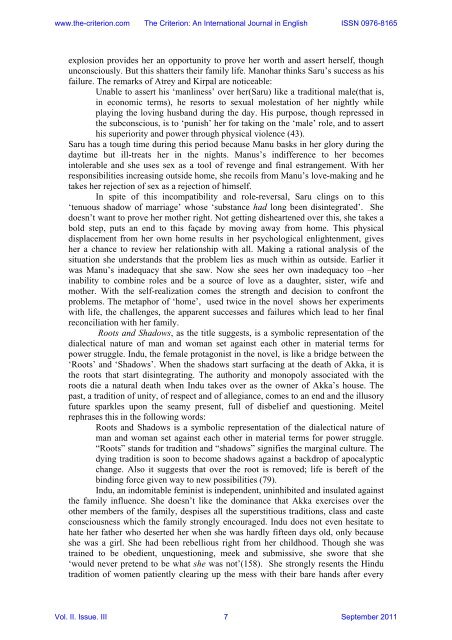Vol. II. Issue. III September 2011 - The Criterion: An International ...
Vol. II. Issue. III September 2011 - The Criterion: An International ...
Vol. II. Issue. III September 2011 - The Criterion: An International ...
You also want an ePaper? Increase the reach of your titles
YUMPU automatically turns print PDFs into web optimized ePapers that Google loves.
www.the-criterion.com <strong>The</strong> <strong>Criterion</strong>: <strong>An</strong> <strong>International</strong> Journal in English ISSN 0976-8165<br />
explosion provides her an opportunity to prove her worth and assert herself, though<br />
unconsciously. But this shatters their family life. Manohar thinks Saru’s success as his<br />
failure. <strong>The</strong> remarks of Atrey and Kirpal are noticeable:<br />
Unable to assert his ‘manliness’ over her(Saru) like a traditional male(that is,<br />
in economic terms), he resorts to sexual molestation of her nightly while<br />
playing the loving husband during the day. His purpose, though repressed in<br />
the subconscious, is to ‘punish’ her for taking on the ‘male’ role, and to assert<br />
his superiority and power through physical violence (43).<br />
Saru has a tough time during this period because Manu basks in her glory during the<br />
daytime but ill-treats her in the nights. Manus’s indifference to her becomes<br />
intolerable and she uses sex as a tool of revenge and final estrangement. With her<br />
responsibilities increasing outside home, she recoils from Manu’s love-making and he<br />
takes her rejection of sex as a rejection of himself.<br />
In spite of this incompatibility and role-reversal, Saru clings on to this<br />
‘tenuous shadow of marriage’ whose ‘substance had long been disintegrated’. She<br />
doesn’t want to prove her mother right. Not getting disheartened over this, she takes a<br />
bold step, puts an end to this façade by moving away from home. This physical<br />
displacement from her own home results in her psychological enlightenment, gives<br />
her a chance to review her relationship with all. Making a rational analysis of the<br />
situation she understands that the problem lies as much within as outside. Earlier it<br />
was Manu’s inadequacy that she saw. Now she sees her own inadequacy too –her<br />
inability to combine roles and be a source of love as a daughter, sister, wife and<br />
mother. With the self-realization comes the strength and decision to confront the<br />
problems. <strong>The</strong> metaphor of ‘home’, used twice in the novel shows her experiments<br />
with life, the challenges, the apparent successes and failures which lead to her final<br />
reconciliation with her family.<br />
Roots and Shadows, as the title suggests, is a symbolic representation of the<br />
dialectical nature of man and woman set against each other in material terms for<br />
power struggle. Indu, the female protagonist in the novel, is like a bridge between the<br />
‘Roots’ and ‘Shadows’. When the shadows start surfacing at the death of Akka, it is<br />
the roots that start disintegrating. <strong>The</strong> authority and monopoly associated with the<br />
roots die a natural death when Indu takes over as the owner of Akka’s house. <strong>The</strong><br />
past, a tradition of unity, of respect and of allegiance, comes to an end and the illusory<br />
future sparkles upon the seamy present, full of disbelief and questioning. Meitel<br />
rephrases this in the following words:<br />
Roots and Shadows is a symbolic representation of the dialectical nature of<br />
man and woman set against each other in material terms for power struggle.<br />
“Roots” stands for tradition and “shadows” signifies the marginal culture. <strong>The</strong><br />
dying tradition is soon to become shadows against a backdrop of apocalyptic<br />
change. Also it suggests that over the root is removed; life is bereft of the<br />
binding force given way to new possibilities (79).<br />
Indu, an indomitable feminist is independent, uninhibited and insulated against<br />
the family influence. She doesn’t like the dominance that Akka exercises over the<br />
other members of the family, despises all the superstitious traditions, class and caste<br />
consciousness which the family strongly encouraged. Indu does not even hesitate to<br />
hate her father who deserted her when she was hardly fifteen days old, only because<br />
she was a girl. She had been rebellious right from her childhood. Though she was<br />
trained to be obedient, unquestioning, meek and submissive, she swore that she<br />
‘would never pretend to be what she was not’(158). She strongly resents the Hindu<br />
tradition of women patiently clearing up the mess with their bare hands after every<br />
<strong>Vol</strong>. <strong>II</strong>. <strong>Issue</strong>. <strong>II</strong>I 7 <strong>September</strong> <strong>2011</strong>
















